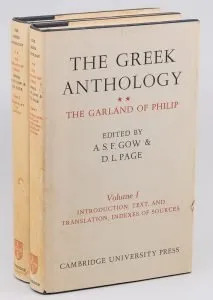The epigraph not used …
I was tempted, just for a moment, to preface all that abstract nonsense, all those higher ramblings, with
καὶ παίζειν ὅτε καιρός, ἐπαίξαμεν• ἡνίκα καιρὸς
οὐκέτι, λωιτέρης φροντίδος ἁψόμεθα.
When it was time for play, we played. Now that is no longer
we will apply ourselves to higher thoughts.
So writes Philodemus, the final two lines of one of his epigrams (AP 5.112). But I wonder who dips into the Greek Anthology these days?
 Once upon a very long time ago, early in my Aberystwyth days, I found in Ystwyth Books (which still exists) an almost new copy of the Gow and Page edition of the Garland of Philip. I was tempted, and fell (how appropriate — falling into temptation being a recurrent theme of the epigrams!). And I have occasionally picked up the first volume — the poems and their (prose) translations — with pleasure, ever since. The second volume, though, is a rather stunning monument to old-fashioned scholarship, but not exactly light reading.
Once upon a very long time ago, early in my Aberystwyth days, I found in Ystwyth Books (which still exists) an almost new copy of the Gow and Page edition of the Garland of Philip. I was tempted, and fell (how appropriate — falling into temptation being a recurrent theme of the epigrams!). And I have occasionally picked up the first volume — the poems and their (prose) translations — with pleasure, ever since. The second volume, though, is a rather stunning monument to old-fashioned scholarship, but not exactly light reading.
The Garland is the ancient anthology compiled by Philip of Thessalonica of epigrams, short poems from a period of about a century and a third, roughly 90 BC to 40 AD, one of the precursors of what we think off as the Greek anthology. As our editors tartly remark, “A few of the authors are of high quality, most are mediocre, a few are worthless”. But yet … the voices still echo down on the perennial verities, the brevity of life, the randomness of fate, the pleasures and follies of the human world, the need to seize the day:
Dead, you will lie under a yard of earth,
Far from daylight and all delighting,
So drain the cup, …
as Argentarius put it (as translated by Fleur Adcock).
And Philodemus of Gadara? He’s not just the author of the twenty nine epigrams — mostly decidedly racy — in Gow and Page (and perhaps another handful, as in David Sider’s more recent edition of The Epigrams Of Philodemos), but he is also an Epicurean philosopher of some note, a pupil of Zeno’s. A number of damaged but half-readable rolls of his philosophical writings were discovered when his patron Piso’s villa was excavated at Herculaneum. Philodemus wrote, among much else, On Methods of Inference discussing for example when it is appropriate to argue, as we would say, by induction from observed cases to new cases. He even gets an entry in the Stanford Encyclopaedia of Philosophy. A man of parts, then, who applied himself to higher thoughts!
The post The epigraph not used … appeared first on Logic Matters.



